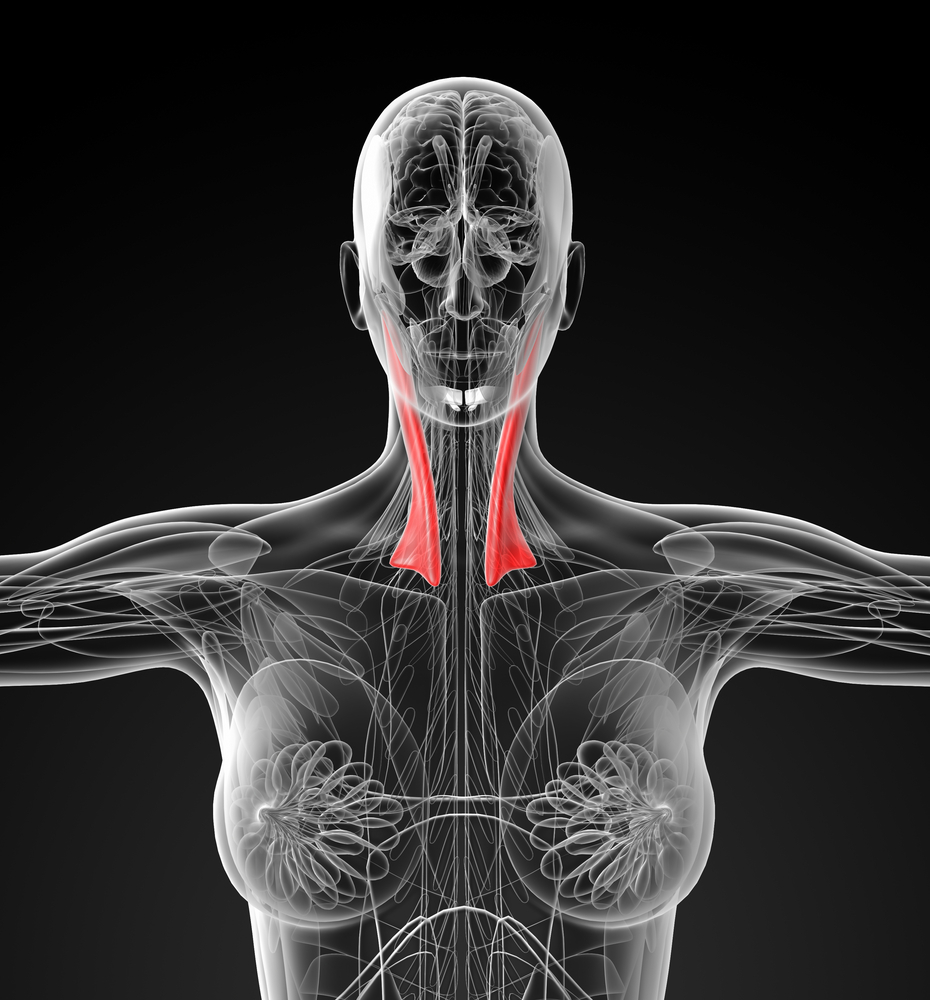The twists and turns of torticollis
Hello readers and welcome to our August 2020 blog. This month’s topic is a neck condition known as ‘Torticollis’. You may have also heard this condition referred to as ‘wry neck’.

What is Torticollis?
Torticollis is a painful neck condition where one of the strong muscles on the side of the neck shortens, causing the head to twist and tilt out of its normal position. The muscle we are referring to is the ‘Sternocleidomastoid’, or SCM for short. It’s easy to locate this long ‘strap’ muscle… Turn your head to the left and the SCM pops out on the right-side of the neck. Trace a line from the base of your skull just behind the ear, down to the top of your breastbone and you should be able to feel the muscle. Although the name is a bit of a mouthful, it perfectly describes the at-tachment points for the muscle on the body:
• Sterno- refers to ‘sternum’ which is the name of your chest / breastbone
• Cleido- refers to ‘clavicle’ which is the name of your collar bone
• Mastoid- refers to the ‘mastoid process’ which is a bony lump found behind the ear at the base of the skull
There is a SCM muscle on each side of the neck. This muscle helps you to:
• Turn your head to the opposite site
• Touch your ear to your shoulder
• Bend the neck forward
• Tilt the head backwards
• Breathe (it is an ‘accessory' muscle for breathing - kind of like a little helper to the main breath-ing muscles)
Types and causes
There are two main types of torticollis—congenital and acquired.
Congenital torticollis means the condition is present at birth. This problem can develop in the mother’s womb if the baby’s head is held in an awkward position, or if the blood supply to the muscle is disrupted. Sometimes the bones in the neck do not develop properly and become fused together, this can also lead to a rare type of torticollis called Klippel-Feil Syndrome.
Acquired torticollis means the condition develops after birth. The condition is common in both children and adults. Acquired torticollis can be caused by injury to the muscle, or the nerve that supplies electricity to the muscle. In the majority of cases, the cause is completely unknown. As with congenital forms, there are some rarer acquired types, including ‘spasmodic’ torticollis. This type is also known as ‘cervical dystonia’ and is a form seen in adults where all the usual symp-toms are seen, but may also come with a jerking type motion of the head caused by spasms in the SCM muscle.
Signs and symptoms
The signs and symptoms of torticollis depend on the type, but the main features include:
• Neck pain and/or stiffness
• An inability to move the head in the usual way
• A tilted head to one side
• Swollen and tender neck muscles
• Uneven shoulder height
• Headaches
Treatment
Parents reading this who have experienced torticollis with their newborn or young child will prob-ably remember the stress that comes with seeing their helpless little human with a seemingly un-changeable head position. It really is quite unsettling. The good news is that for the majority of cases, some focused regular stretching is all that’s needed to correct the head position and re-store the muscle to its full length. Young children usually respond very quickly to hands-on treatment.
Some of the rarer congenital forms of torticollis can also be treated in a similar way, but these forms may also require the opinion of a surgeon who can perform a procedure to lengthen the muscle. As with a lot of conditions, surgery is a last resort and will only be considered when all non-surgical treatment techniques have failed.
Other treatment techniques used for torticollis include:
• Massage of shortened and tight muscles
• Heat pack therapy to increase blood flow and relax tight muscles
• Joint mobilisation and manipulation
For people who live with a permanent or chronic torticollis, other complications are common. These include difficulties carrying out activities of daily living, depression, social isolation and chronic pain. Treatment should be from a multidisciplinary approach. This means that as well as seeing your physio for hands-on therapy, your doctor, psychologist, friends and family will all play a part.
If you or a family member are struggling with torticollis, or a neck issue of another kind, please call us here at Back in Business Physiotherapy on 02 9922 6806 to arrange a convenient time to come in for a consultation. We’d love to help unravel the twists and turns of your torticollis and get your neck feeling relaxed and happy
Uploaded : 20 July 2020




